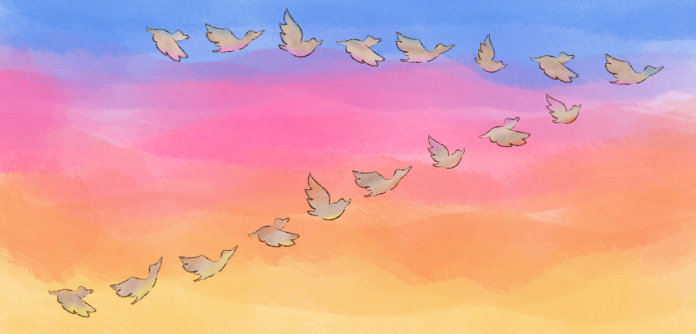Han Do
Contributing Writer
This fall of 2021, UC Santa Barbara’s (UCSB) Dean of Students Office is rolling out the Flocks program to help second-year and transfer students ease their transition back to campus by providing mentors and resources to address difficulties that may arise regarding the students’ social and academic lives.
Emma Parker, student affairs specialist from the UCSB Dean of Students Office, was able to sit down with us and share a few details about the new program.
“We recognize that this year our second-year students, who’ve missed out on their first-year-experience due to COVID-19, are going to have some very unique challenges and needs. We tried to come up with something that would alleviate some of that pressure,” said Parker.
Parker, who has been teaching “Introduction to the University” seminars to first-year students , said that the Flocks program is modeled somewhat similarly to those seminars.
There are around 10-15 students in each flock, each assigned a student mentor and a faculty mentor. The faculty mentor is meant to step in for any challenge that may arise in terms of logistics or how the program is run. Meanwhile, the student mentor is someone who could really connect with the students, as they have been in the students’ shoes just a short while ago and could provide students with resources and a perspective from a fellow UCSB student.
Each week, the student mentor plans an activity for students to do together, depending on what they think is important for students to know, as well as what would fit a specific flock’s interest and needs.
Campus tours are a staple; it is important to show the students the resources UCSB has to offer and where to get them — anything ranging from how to access research materials from the library to getting advice from career services to getting your bike fixed.
Other than tours, there is a real variety to what Flock activities can look like. Some mentors take their mentees to soccer games, others to In and Out — others have a beach day or simply take the bus together.
Casidy Chen, a student mentor and fourth-year anthropology and sociology major, said that their flock was able to invite a professor from the Department of Asian American Studies to talk to them about research opportunities, going to office hours, and how to get help with your classes in general.
However, the new program is not without its hiccups. Initially, around 400 students signed up to be in a flock; however, turn outs have been more or less inconsistent.
“Our group was supposed to have 11 mentees, but so far, we only have two people consistently come out,” said Chen. “I heard from other flocks that they’re experiencing similar numbers, so I felt less bad about it.”
For the students that do actually show up to the meetings, though, the program has worked really well for them.
Mikyla Maglente, a transfer student majoring in actuarial science, has found the meetings especially useful for knowing where to access academic resources and research opportunities.
“It’s definitely overwhelming to be commuting to classes again. I appreciate that our mentor put in a lot of effort to make us feel welcomed,” said Maglente.
Ariana Wu, a second year economics major, said, “I’m probably not gonna remember everything that was said on the tour, but it was still very comforting exploring campus with other people and it made everything seem a lot less overwhelming.”
Chen, who has taken on mentor roles previously in various clubs and school activities, said, “Mentoring is something that I really enjoy and it helps me grow as well. I’m really glad that my mentees seem to be adjusting well and getting used to their classes.”
As the flocks are relatively new, there is likely to be some trial-and-error as the program continues to grow. However, second-year students should know they are not alone. Many of us are also struggling with adjusting to in-person classes and learning how to talk to real people again, albeit in slightly different ways. After all, some things just need a bit of time.











